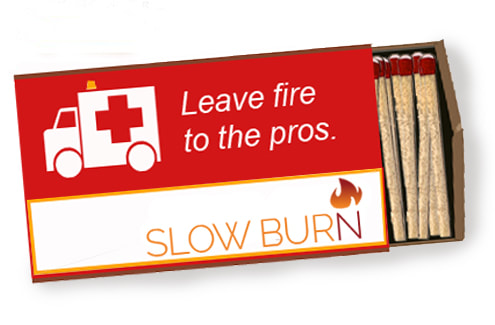 YES, THERE ARE STILL BURNING QUESTIONS FROM LAST YEAR Believe it or not. There are faithful readers out there who sent their burning questions at the end of Q4. They're still waiting for your relentless scribe to answer them here at the end of Q1. Since I've received no Constant Contact unsubscribe notices bearing their names, I assume they're still reading. And today's question comes from a man whom I've known professionally for many years. When we first began our professional association years ago, he was a Copywriter & Production Manager. Today, he is a Business Manager. THAT LATTER TITLE ALONE WOULD TERRIFY MOST COPYWRITERS Which leads one to believe, this man is destined for bigger things than mere copywriting. He may even be destined to be a boss of copywriters. During my career, I was occasionally offered gigs that strayed away from grappling with the blank page to managing people and details and hardware. I've been a coordinator, manager and producer. And I was pretty good at it. But NEVER would I ever want to be the boss of copywriters. That's not a job that requires herding cats. It requires herding rainbow unicorn cats with a bad attitude. HE'S A BETTER MAN THAN I AM And his burning question stems from his need to manage people. His job description requires him to "boost morale in many ways." Which seems to feed right into his query: "How 'bout tips on motivation" when it comes the sales staff writing radio commercials? (Fear not: we will make this apply to you, too.) This is a very, very dangerous question to be asking me. The first thing I'll say is that the sales staff shouldn't be writing the commercials. THE SALES STAFF SHOULD BE OUT SELLING AIR TIME AND MANAGING CLIENTS No account rep ever said, "Boy, I want to write me some advertising!" They say things like, "I want to go out there, wrangle clients and make a pile of money!" Indeed, some account reps don't fit this paradigm. But by and large, sales people are extroverts motivated by going out and making money. That's at odds with the introverted, intellectual task of writing scripts. That's not to say they don't want to do it, or can't do it. Some do and some will. BUT THERE'S NO EARTHLY REASON A RADIO STATION DOESN'T HAVE A COPYWRITER ON STAFF Except that they're cheap. Many corporate bean counters can figure out some way to justify eliminating a fulltime copywriter. I know because I've seen it happen. National award-winning, ROI-producing, failure-reversing, published copywriter working for half the going salary of his position gets canned because a bean counter up the chain doesn't understand how to measure the results that keeps advertiser on the air--and it's the advertisers who keep the lights on. Radio is like any business (not yours, we hope) that has turned sad because of a poverty mentality and inability to understand the value of soft assets. But I digress. The sales staff are required to write their own scripts. How does a business management guy keep them motivated? How does he inspire them to be creative, and write things that are better than the standard announcer-driven rip & read yawn fest for "all your fill in the blank needs"? And how do I make it relevant to you, the non-copywriter? I HAVE NO IDEA Because trying to motivate anyone to do something he has no interest in doing is a really bad idea. However, that answer doesn't help anyone. It will not earn me my pay on this fine Tuesday morning in early spring. So all I can do is offer a couple of tips that work for me personally, and hope they can be adapted in a way that piques the interest of an aggressive, extraverted, money-motivated sharpie in a designer suit who really has no interest in sitting down and negotiating with himself over single words and comma placements. So, the first place I always go when looking for motivation? THE AWARD-WINNING COMMERCIALS Frequently, I sit and listen to the commercials that won the big awards, especially the Radio Mercury Awards. In fact, early in my career, the idea of winning a Mercury was an huge motivator for me. This is the Oscars of radio advertising. There are also huge cash prizes. They are not easy to win. In the main, Mercury-winning advertising is really well executed from concept to completion. Sadly, while they're always creative, they're not always good advertising. Whoever is using them as motivation needs to understand the difference. LOOKING AT OR LISTENING TO INSPIRING WORK IS A GREAT MOTIVATOR It doesn't matter what business you're in. If you see work that raises the bar for your industry, using it as a yardstick for yourself can improve your own work. Whether you're writing radio, building a website or opening a retail store, look at the someone who has done it really well. Look at the success stories. Then say, "How can I make that better?" That doesn't mean copying it and then changing the color from green to pink. That's lame. INSTEAD, FIND A PRODUCT THAT MAKES YOUR HEART BEAT JUST A LITTLE FASTER Find a version of what you do (or want to do) that makes you envious. Then say, "OK, how do we improve on that?" Or, "What can I take from this to apply in my own work?" In writing, it can be as simple as hearing a ballsy conceit in a radio commercial, like insulting the advertiser for a big payoff, and thinking, "Wow, I want to be that edgy." The man who submitted the query had suggested that maybe it was about getting a rep to write a two-voice spot instead of a one-voice spot. COUNTING THE NUMBER OF VOICES MISSES THE POINT What are you doing with the voices that are in the commercial to begin with? Are they interesting? Are they engaging? Are they saying something that makes the listener say, "Tell me more!" That can happen with a single voice. And those criteria can be applied anywhere, no matter what you're creating. Is what you're doing interesting, engaging and leading the horse to water? Say you're opening a casual restaurant. You like the interior decoration motif of Chipotle. Does that mean you should copy Chipotle? OF COURSE NOT! THAT'S LAZY THINKING! But it should lead you to ask, "What have they done, and what can I do that's similar but different?" Maybe you think, "I know, my restaurant is going to look like the original Banana Republic! We're going with a military surplus motif, and all of our meals will be served in old tin mess kits! And the place will look like the inside of a M*A*S*H tent." Yes, it sounds really stupid. But maybe it would work. The point is, you're looking at the creative topology of something that inspires you (Chipotle) and looking for a different conceit that is equally unique and makes the customer feel something. A restaurant experience is theater. What play do you want your customer to feel like they're in? OKAY, MAYBE WE'RE GETTING A LITTLE FAR AFIELD HERE Now I'm going to have to start saying things like, "No, I didn't mean it's literally a theatrical experience. That's a metaphor." Experience has taught me that anything that isn't direct, literal and simple really throws someone who is direct, literal and simple. Like, a fellow copywriter once came to me for advice. I said that it's useful to look for inspiration in poetry you enjoy, and handed the writer a book of verse by Andrei Codrescu, a Romanian immigrant who's a former Mac Curdy Distinguished Professor of English at Louisiana State University at Baton Rouge and an NPR commentator and very funny. That copywriter never, ever asked me for any advice ever again. Some people have a very difficult time coloring outside the lines they've defined for themselves. And frequently, those lines are chokingly narrow. THE OTHER WAY TO LOOK FOR MOTIVATION REQUIRES A NUT When I was working in Los Angeles radio, there was a production director who was a lunatic. If I had a germ of an idea that needed fleshing out, I would go to him. I'd say, "We have a new client with a swimming pool cleaning service. I'm thinking a story about a homeowner who has a chronic problem with alligators in the pool." It wasn't even necessary to finish the thought before there were a dozen different ideas about the alligator problem and how the advertiser solves it, ranging from big steel nets on cranes to hand grenades and tactical nuclear weapons. Did that mean I ended up writing a commercial about a pool service that provided a tactical nuclear weapon service to remove alligators from the pool? No. BUT THE FEW MINUTES SPENT WITH THE NUT PUSHED THE STORY WAY OUTSIDE THE LINES It gave me new ideas that completely changed the way I was approaching the creative problem. And it often inspired a new and reasonable solution that made for a better advertisement. And again, this method isn't limited to radio advertising. Whenever you're looking for new inspiration for a creative challenge, it can help to talk to someone who isn't immersed in the challenge and can bring crazy outside ideas into the equation. And it can be a surprising motivator for doing better work. It sparks excitement and propels you to create. Whether any of this will be of use to our business manager, I have no idea. But across the board, no matter what business you're in, it helps to have outside inspirations, inside inspirations, and a willingness to stray outside the lines to create better work. Just make sure that ultimately, you're creating the new work for the person at the other end of the communication. Because if all you're doing is entertaining yourself, you're doing a disservice to both yourself, your client (if there is one), and whoever is supposed to be receiving the message.
0 Comments
Leave a Reply. |
AuthorBlaine Parker is prone to ranting about any and all things related to brand. In many ways, he is a professional curmudgeon. While there is no known vaccine for this, the condition is also not contagious. Unless you choose it to be so. Archives
February 2022
Categories
All
|
|
© Copyright 2020 Slow Burn Marketing LLC |

 RSS Feed
RSS Feed

